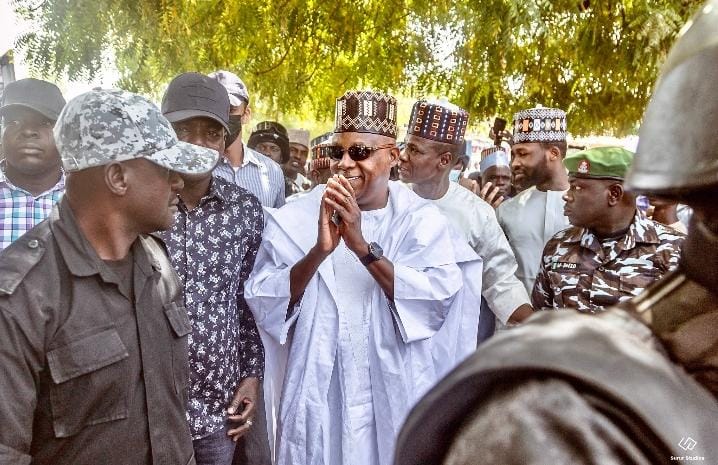
Penultimate Saturday’s presidential and National Assembly polls threw up upsets here and there. There were many first time voters, even as the Independent National Electoral Commission (INEC) ran into troubles over the use of its technological innovation for a credible process.
While the presidential running mates of two out of the three leading candidates, Governor Ifeanyi Okowa of Peoples Democratic Party (PDP) and Senator Yusuf Datti Baba-Ahmed of Labour Party (LP), lost their states, that of the governing All Progressives Congress (APC), Senator Kashim Shettima, escaped such embarrassment.
Although there was high turnout of eligible voters in Borno State, particularly in Maiduguri, the state capital, INEC officials and election materials were slow in reaching the polling units. Despite the delays in the arrival of materials and balloting, voters remained peaceful, just as hawkers of snacks and water had a field day.
The tardy process caused by late arrival of election materials and officials of the Independent National Electoral Commission (INEC) seemed unusual because as early as 7.00am, sensitive materials had left the Commission’s state headquarters.
That could explain why voting started around 9a.m in some polling units, while election materials could not reach other places by 11a.m. In the areas where accreditation began quite early, the exercise witnessed glitches associated with the Bimodal Voter Accreditation System (BVAS).
Voters massed at the Lamisula junior primary school in Maiduguri metropolis without any sign of INEC officials. At the Lawan Bukar ward, the Vice Presidential candidate of All Progressives Congress (APC), Senator Kashim Shettima, waited patiently for two hours before retreating to the Government House.

Meanwhile, at Kashim Shettima Street, GRA Maiduguri, the former governor’s second daughter cast her ballot at PU 048 at exactly 9.45 am, describing the accreditation process as swift and seamless.
While voters waited for INEC officials and election materials, discussions ran freely on the state of the country and comparison between the Shettima years and those of Governor Babagana Zulum.
A middle-aged Ankar Umoru, who was dominating the discussion at Sokoto Road polling unit, said most of the road projects in the capital city were put up by Governor Zulum, stressing that the traffic gridlock near the customs was solved by the overpass constructed by Zulum administration.
Some of the voters noted that they preferred voting for the presidential candidate of Peoples Democratic Party (PDP), even as they wondered why Shettima should agree to be running mate. Others said they wanted former Kano State governor, Senator Rabiu Kwankwaso, because of how he worked during his term as governor.
It was obvious that the electorate were divided over the profiles of Shettima as Vice Presidential candidate and Atiku as presidential candidate. This consideration played out when the results started trickling in.
For instance, at Kwaya-Kusar Local Government Area collation centre, where Prof. Sule Taji served as collation officer, APC garnered 8, 420 votes, while PDP and NNPP returned 7, 254 and 328 ballots respectively. LP got 123 votes out of the 16, 539 valid votes cast, just as 799 were invalid. The total number of registered voters stood at 53, 302.
In Konduga with 99, 231 registered voters, 16, 276 were accredited to vote on the election day, but 1, 238 ballots were rejected. Then, out of the 14, 896 valid ballots, APC received 10, 021, PDP, 4, 119 and NNPP had 111. LP was credited with 76 votes, according to Prof. Timothy Yerima, the collation officer.
In Gubio, where APC scored 519, PDP had 2, 127 and NNPP 440 votes. Similarly, in Nganzai LGA, where Prof. Adam Mohammed Jubrin collated the ballots, total votes cast was 5, 588, but 458 were noted as rejects. Out of the 5, 130 valid ballots, APC’s share was 3, 468, while PDP and NNPP recorded 1, 513 and 12 in that order.
By 12 noon on Sunday February 26, when collation results started, there were muted voices that something out of the normal must have happened. There was pain on the faces of many voters. It was not easy to differentiate whether the pain was on account of the fire incident that consumed the popular Maiduguri Monday Market, or vexations over the turn the election took.
In the general outcry over the market inferno, the voices of those who wanted to draw a correlation between the early morning fire and the uneven vote numbers were muffled.
However, the PDP candidate for Borno Central Senatorial District in the election, Mallam Mohammed Umara Kumalia, called on the Resident Electoral Commissioner (REC), the collation and returning officers for the Presidential and House of Representatives seats to cancel the elections in eight Local Councils.
The councils, which make up Borno Central, include Maiduguri Metropolitan Council (MMC), Jere, Bama, Konduga, Kala/Balge, Dikwa, Mafa and Gambouru/Ngala Local Councils.
Kumalia, who made the call, while addressing a news conference at the Nigeria Union of Journalists (NUJ) Press Centre, Maiduguri, alleged gross irregularities.
He stated: “The elections in the eight local councils were conducted without following the election guidelines and procedures as outlined in the election manual and the 2022 Electoral Act.”
While bemoaning the wanton “infractions and manipulations” during the Presidential and National Assembly elections in the Senatorial district, Kumalia stressed that the use of the Bimodal Voter Accreditation System (BVAS) machines was generally disregarded by the electoral officials.
He was flanked during the press conference by four other PDP candidates, including Babakura Abba Yusuf, (Maiduguri Metropolitan Council (MMC) federal constituency); Ahmed Mohammed Zannah, (Dikwa/Mafa/Konduga federal constituency); Abudulrazaq Ahmed Zannah, (Bama/Ngala/Kala-Balge federal constituency).
The Senatorial contender noted that there were widespread incidents of over voting across the eight local governments, alleging that “voters at the polling units were accredited manually without the use of the BVAS machines.”
He pointed out that there were also alterations on election result sheets after the elections, adding that result sheets from the polling units were not uploaded to the INEC server/portal after the elections in accordance with the election guidelines.
Doubling down on the series of infractions during the election, Kumalia stated: “There were incidences of over voting in several units across the local government, including Lamisula Jabbamari, Bolori I, Bolori II, Gwange I, II, and III, Shehuri South, Shehuri North polling units.
“There was alteration of results of units after completion of elections across the 15 wards of the local Council. There was also massive destruction of ballot papers by APC stalwarts and elections did not hold in some polling units.
“Moreover, results of elections in some polling units won by PDP were not entered into the collation sheet at the ward level.”
The PDP chieftain disclosed how party agents were chased out of the collation center at about 2.a.m after collation of about 120 out of the 200 units where PDP was leading comfortably in Maisandari ward. He added that election results were, however, manipulated and doctored to favour the APC candidates.
Governor Zulum, who cast his ballot by 12 noon at Ajari PU 006, Mafa, Mafa Local Government Area of the state, said it was too early to comment on the situation in the entire state.
Of course, the governor drove for about 50 kilometres from Maiduguri to Mafa to discharge his civic responsibility, as such he could only get snippets of information of what was going on in the state capital.
Although he said he was satisfied with the process shortly after voting for the presidential and National Assembly candidates, Prof. Zulum noted, “Based on what I have seen so far, the voting process is going on smoothly. It has taken a very short time for me to be accredited and cast my vote, I believe the other polling units will be like this one.”
He commended voters for turning out en mass to vote at his home- town, Mafa, saying that it was remarkable that citizens are conducting themselves in orderly and peaceful manner.

He regretted the “few complaints” received from Maiduguri, the state capital over the glitch on associated with Bimodal Voter Accreditation System (BVAS).
“Yes, I received some complaints from Maiduguri regarding BVAS, so while I commend what I have seen here, I can’t talk of the entire state until I get reports from our agents from the 27 Local Government Areas of the state,” he noted.
Also in his remarks to journalists after returning from the Shettima Kuawa 023 PU, where he eventually cast his ballot, the APC Vice Presidential hopeful, expressed optimism that APC will win the elections with a landslide victory.
“Our party will win the presidential election with a landslide victory across the country,” he reiterated, stressing that triumphing at the polls is one part of the story to unite people, fight poverty and unemployment in the six geopolitical zones of the country.
Commenting on the conduct of the election, Senator Shettima had urged INEC to extend voting till 7.00 pm, even as he lamented that election officials and materials arrived late at 10.45am in most of the polling units in Maiduguri Metropolitan Council (MMC).
While noting that the presidential election was a momentous one, Shettima explained that the poll will unite the people irrespective of their political affiliations and ethnicity.
Consequently, the APC chieftain maintained that extending the allotted time by INEC is a necessity, since according to him, that will make up for lost time on account of late arrival of material at most polling units.
He warned INEC not to let the country down, noting that the Commission cannot afford to mess up the 2023 general elections. “Let us give INEC the benefit of the doubts in conducting a credible, free, fair and peaceful general elections in the country.” he added.
Also, former National Secretary of APC, Architect Waziri Bulama, who cast his vote at Galadima Mai Duloma, Maiduguri, by 11am, told The Guardian that the exercise was peaceful and orderly.
Bulama, who is also a member of the APC Presidential Campaign Council, said accreditation did not take more than three minutes. “Actually the accreditation took less than one minute, they looked for my name on the voter register, then entered my name and it popped out,” he narrated.
He said APC campaigned vigorously around the country and connected with Nigerians, saying that the party would return victory at the polls.
Another voter, Ahmed Mustapha, who shared his experience with The Guardian at Sir Kashim Ibrahim polling unit 001, however, said INEC deserves kudos for commencing accreditation as early as 9.00am.
He noted that the presiding officer, Suleiman John, did not complain of any logistic problems, even though some other polling units in the Maiduguri metropolis started accreditation of voters from 9.00 and 10.30 am.
The general impression among voters in the state is that the use of BVAS and real time uploading of polling unit level results in subsequent elections would give an idea of the level of ballot suppression or otherwise.



